business
Crypto Crystal Ball 2025: Will VCs Go Crypto Crazy Again?
Published
3 months agoon
By
admin

Among other things, 2024 saw an undeniable glow-up for the crypto industry, both in terms of market strength and political reputation. Now other sectors are once again taking note, setting up what could either be a rehash of 2021’s crypto bull market, or something else entirely.
At the end of every year, Decrypt looks into its Crypto Crystal Ball to augur the narratives likely to shape the coming year, and how they’re likely to impact you.
After examining Donald Trump’s crypto agenda and the odds that an upcoming Ethereum update could finally bring about mass adoption, here’s a look at how crypto’s relationship with venture capital is poised to change in 2025—and what shift could mean.
Back in 2021, crypto was the belle of the VC ball. But as soon as the digital assets market crashed, our novel industry suddenly became persona non grata on Wall Street and in the Bay Area. Any mention of crypto or NFTs was scrubbed from project pitch decks like the Black Plague.
Now that crypto prices are finally soaring again, it looks like venture capitalists are already trying to get back together with blockchain devs—and pretend the break-up never happened.
Both VC giant Andreessen Horowitz and famed Silicon Valley startup incubator Y Combinator announced in December that they are once again eagerly seeking to back crypto-related projects in 2025.
Of particular interest are projects related to stablecoins. Luke Gebb, the head of American Express’ Digital Labs division, told Decrypt that 2025 “will mark a pivotal year for the stablecoin industry” that could “transform the payments landscape.” Indeed, Y Combinator is specifically seeking stablecoin-related startups.
Why the sudden turnaround? Turner Novak, a tech-focused venture capitalist, thinks the answer is brutally simple.
“VCs chase momentum,” Novak told Decrypt. “They will always be back if prices are going up.”
But should crypto be so quick to take VCs back, years after being dumped?
Alexander Lin, a blockchain-focused investor at Reforge, is adamant that the industry should resist the impulse. As Lin sees it, the lesson of the last bull cycle was that venture firms dumped billions of dollars into worthless crypto projects to turn a quick buck, and the industry suffered immensely as a result.
“They invested in dogshit projects, founders that had misaligned incentives, and projects that had the sole priority of launching a token quickly,” Lin told Decrypt.
It makes sense why, Lin said. Investing in such projects allowed venture firms to dodge waiting years for an acquisition or IPO to make a profit. If these firms got in early to a crypto project, hyped it up, and then got out shortly after a token launch, it didn’t matter if the token—and the project—crashed months later. The gambit was successful on the VC’s balance sheet.
If traditional VCs have learned one thing from the last crypto bull cycle, Lin said, it won’t be to invest in durable blockchain companies that will grow over time; it will be instead, to get in even earlier to speculation-fueled projects.
Lin thinks that cycle, if repeated, could be detrimental to crypto’s long-term prospects. To prevent such an outcome, he says it’s essential for crypto projects to reject investors looking to wet their beaks on crypto’s current $3 trillion market cap; he said, instead, projects should only partner with backers focused on growing crypto to a $20 trillion market cap.
“You don’t get there by investing in meme coins, that’s for sure,” Lin said. “You get there by investing in foundational infrastructure companies.”
Daily Debrief Newsletter
Start every day with the top news stories right now, plus original features, a podcast, videos and more.
Source link
You may like


Pakistan Plans To Legalise Bitcoin And Crypto


‘This Is a Good Sign’: Crypto Analyst Says Bitcoin at a Key Inflection Point, Unveils Breakout Targets for BTC


Meteora shares two proposals on MET token allocation


Trump Aides Look To Reform USAID With Blockchain For ‘Transparency’: Report


Ethereum Price Eyes 50% Drop Amid Heavy ETH Whale Profit Booking
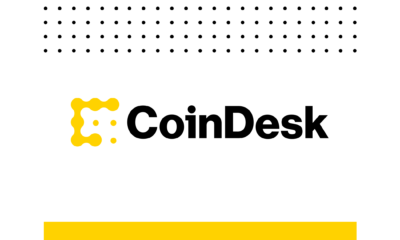

Polymarket is Over 90% Accurate in Predicting World Events: Research
business
Strategy Unveils $500M Stock Raise to Buy More Bitcoin
Published
3 days agoon
March 18, 2025By
admin

Strategy, formerly known as MicroStrategy, said on Tuesday that the software firm plans to raise as much as $500 million through a new offering to buy more Bitcoin.
The company plans to issue a new form of perpetual preferred stock called Strife, which will cost $100 per share and pay a fixed rate of 10%, the company said in a press release.
Available only to institutional investors, Strategy’s new stock would pay its first dividend in around 100 days. What makes the new offering distinct to Strategy’s so-called Strike, another form of perpetual preferred product, is that its dividend is only payable in cash.
Strategy was able to raise billions of dollars last year by selling stock and so-called convertible bonds, which offer 0% interest. Strategy’s Strife offering pays 10% interest, which is more than the 8% dividend for Strategy’s Strike offering in January.
On Monday, the company announced that it had purchased around $10.7 million worth of Bitcoin. Within holdings of the asset that are currently worth around $41.4 billion, the recent purchase grew Strategy’s Bitcoin stash by approximately 0.026%.
Although the company waited several weeks to unveil its latest Bitcoin purchase, analysts told Decrypt that there’s no indication Strategy’s Bitcoin buys will cease soon, despite market conditions that have made it harder for the company to raise cash to buy Bitcoin.
https://x.com/saylor/status/1901969874441654434
On Tuesday, the company’s stock price dropped when markets opened, showing a 6.5% decrease at around $275, according to Yahoo Finance. Strategy shares have fallen 5.5% on the year, but have still doubled in value over the past six months.
Speaking at Future Proof Citywide in Miami on Monday, Strategy co-founder and Executive Chairman Michael Saylor noted Bitcoin’s recent price drop. Shifting rate cut expectations, tariffs, and economic fears have led to a “macro, risk-off zone,” he said.
“When that flips, I think Bitcoin will rip forward with a vengeance,” he added.
Edited by James Rubin
Daily Debrief Newsletter
Start every day with the top news stories right now, plus original features, a podcast, videos and more.
Source link
business
Trump, Associates Net $390 Million Payday From World Liberty Token Sale
Published
4 days agoon
March 17, 2025By
admin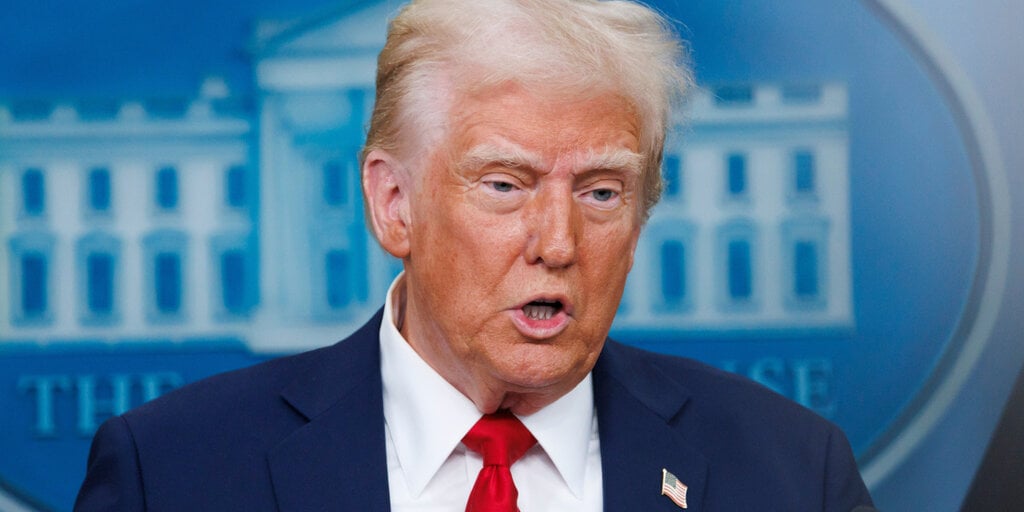
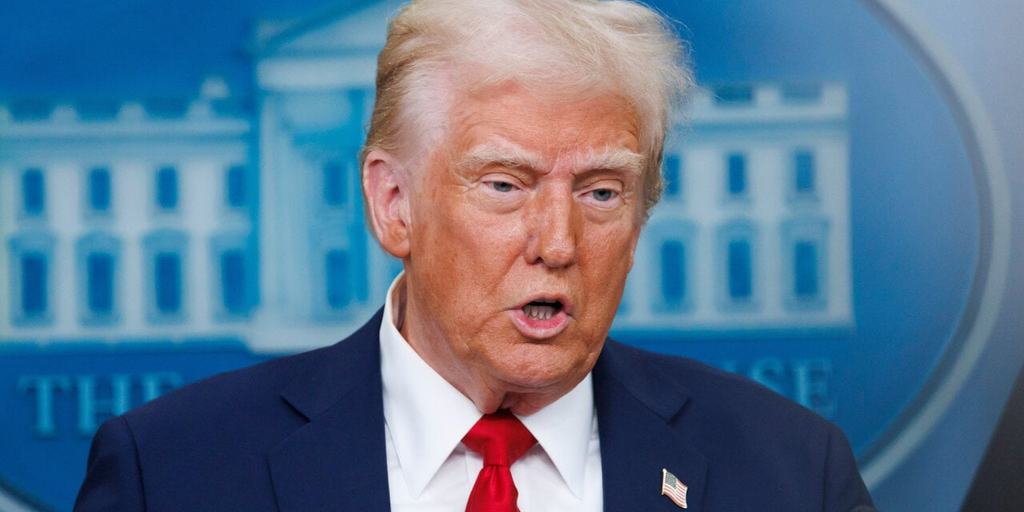
President Donald Trump, and other principals of DT Marks DEFI LLC, have already netted roughly $390 million in revenue from their Ethereum-based decentralized finance project—and that’s just for promoting it.
On Monday, World Liberty Financial announced it had completed its second round of token sales. All in all, the project has brought in $550 million from two rounds of sales of WLFI, its native governance token, according to the company’s own accounting.
Though Trump himself is technically a promoter of World Liberty, and not an active member of the project, the president is still entitled to the lion’s share of revenues the project reaps. According to World Liberty’s gold paper, Trump and his business partners are set to receive 75% of net revenues earned by the project, including WLFI token sales, after operating costs are taken into consideration.
Of the sum raised from sales of WLFI, $30 million has been earmarked to cover company expenses, indemnities, and obligations. Trump and his partners in DT Marks DEFI LLC then get 75% of the remaining amount—a full $390 million—as payment for Trump promoting the project “from time to time” and allowing it to use his name and likeness, according to the project’s gold paper.
It’s unclear who, besides the president himself, will receive funds from the LLC. According to SEC filings, DT Marks DEFI is based in Jupiter, Florida, at the address of the Trump Organization’s executive offices.
When World Liberty first launched token sales in October, the project struggled to attract investors. On the eve of the 2024 election, it had sold less than $15 million worth of WLFI tokens, according to Dune—a fraction of the project’s stated goal of $300 million in sales.
But after Trump recaptured the White House, the project enjoyed a sharp spike in interest. Tron blockchain founder Justin Sun, for instance, said he purchased tens of millions of dollars worth of WLFI, and shortly thereafter joined the project as an advisor.
In late February, the SEC asked a judge to pause its years-long fraud lawsuit against Sun, in order to explore a “potential resolution.”
Since returning to office, Trump has faced questions about potential conflicts of interest, given his personal investment in various crypto ventures at a crucial juncture when his administration is set to effectively write the book on crypto regulation.
One such project, the TRUMP meme coin that launched on the eve of the president’s inauguration, entitles his companies to eventually hold over $9 billion worth of the token at current prices.
Earlier this month, the president’s AI and crypto czar, David Sacks, dismissed the president’s crypto projects as “irrelevant” to industry regulation.
Daily Debrief Newsletter
Start every day with the top news stories right now, plus original features, a podcast, videos and more.
Source link
business
Solana Meme Coin Sent New JellyJelly App Off to a Sweet Start, Founder Says
Published
5 days agoon
March 16, 2025By
admin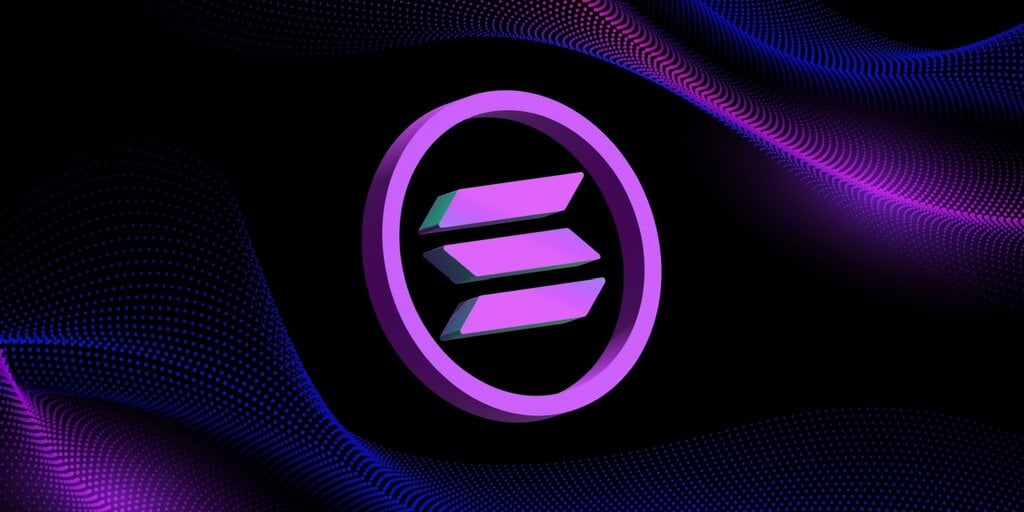
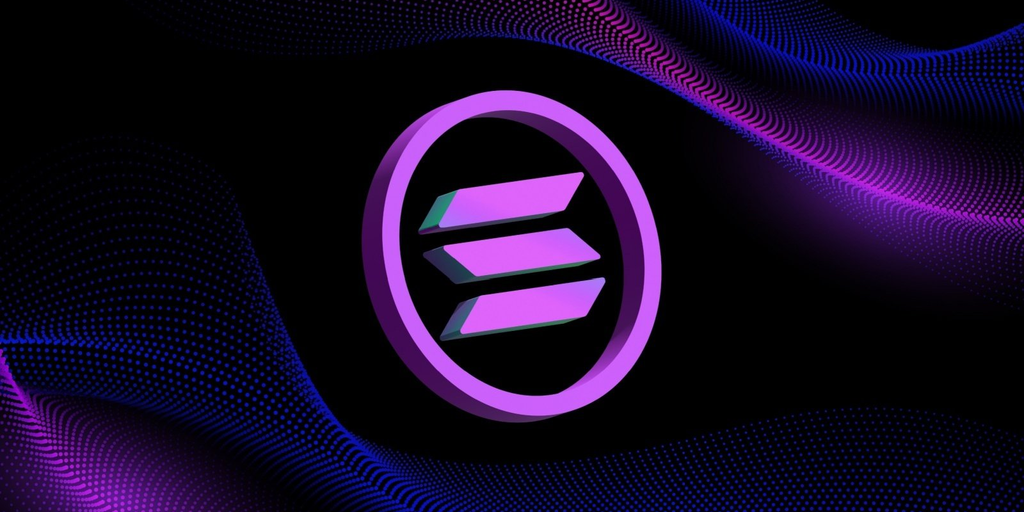
The launch of the Solana meme coin, JELLYJELLY in January prompted signups for an app to soar and a community to form, even after it fell 98% from its all-time high, Iqram Magdon-Ismail, a Venmo co-founder, told Decrypt.
Now nearly two months after its creation, JellyJelly, which debuted on Pump.fun, is set to be integrated into the app.
JELLYJELLY climbed to a $250 million market cap, after it was tied to the in-development AI-powered podcasting app of the same name. But, there were no concrete plans on how the token would be used and it has since crashed to just $6 million.
Magdon-Ismail maintains that the JELLYJELLY token will be implemented into the app soon and explains that, above everything, the meme coin launch was an excellent marketing tool to establish an audience.
“We got 10,000 signups in a day,” Magdon-Ismail told Decrypt. “It brought an incredible amount of awareness. I have to be honest, I never thought of using this whole meme coin world as a form of promotion [but] it’s starting to become very clear to me.”
JellyJelly is essentially TikTok but for podcasters, allowing users to record full episodes on the app which are then clipped up and posted using AI. Users are able to sign up and download the app but it is far from the finished article.
Investor in the app Sam Lessin believes meme coins work as a marketing tool because you immediately attract tons of eyes looking to flip a quick buck on the token. In doing this, some of these traders may become genuinely interested in the product behind the speculative trade. At the time of writing, JELLYJELLY has 34,275 holders. This figure was likely much higher back in January.
“Out of all of that, I think there’s a genuine group of like two to three thousand people in our Discord and Telegram communities that genuinely believe in the product,” Magdon-Ismail said. “If you open the Jelly feed today, I would say 50% of our user base are people that hold the coin.”
Other projects like Pythia, a Russian research lab, have also embraced a meme coin as a form of marketing. Equally, AI projects like Truth Terminal have used related meme coins as a way to fund the development of the project, however, Lessin says that he’s unconvinced that’s in the future of JellyJelly.
“My personal take is: eh,” he said, smiling. “That’s coming out of someone’s pocket in a zero sum way—and, I just don’t think that that feels great. Now, again, I am really open to it down the line.”
JELLYJELLY debuted mostly off vibes and fun, with no solid plans on what to do with it. This lack of clear direction combined with macro downward pressures sent it plunging. But, Magdon-Ismail says the token’s plan has progressed significantly since its spontaneous launch.
“[The plan has] developed very rapidly and swiftly,” he said. “The first thing we’re building into the app is the ability to prove and verify ownership of the coin—how much of the coin you own and how long you’ve held it. Once you do that you get a little Jelly coin badge.”
Alongside this development, a native JellyJelly wallet—akin to the Telegram wallet—is in the works which will allow you to pay and receive tips on the platform. While Magdon-Ismail is optimistic this feature is coming “soon,” he’s apprehensive to put any hard date on it.
Further down the line, the team plans to use data points relating to JELLYJELLY —number of tokens held, tipped, etc.—to determine what content the platform pushes onto users through its algorithm. This is one of many “experiments” that JellyJelly plans to deploy once the token is integrated.
“We don’t have to get it right the first time. We’re going to play with it a little bit,” Magdon-Ismail explained. “We’re going to experiment over the next couple months with ways to utilize the coin to present content in different ways.”
Edited by James Rubin
Daily Debrief Newsletter
Start every day with the top news stories right now, plus original features, a podcast, videos and more.
Source link
1.5M Holders, 10M Blocks on Shibarium

Pakistan Plans To Legalise Bitcoin And Crypto

‘This Is a Good Sign’: Crypto Analyst Says Bitcoin at a Key Inflection Point, Unveils Breakout Targets for BTC

Meteora shares two proposals on MET token allocation

Trump Aides Look To Reform USAID With Blockchain For ‘Transparency’: Report

Ethereum Price Eyes 50% Drop Amid Heavy ETH Whale Profit Booking

Polymarket is Over 90% Accurate in Predicting World Events: Research

Bad news Bitcoin bulls, the long-hoped-for retail is already here: CryptoQuant
Top 6 Important Fed Decisions To Know After SEC Drops Ripple Lawsuit Appeal

Leaders In Adoption And Innovation

Trader Issues Urgent XRP Alert, Says the Top-Five Altcoin at Risk of Sharp Correction – Here’s His Target

This coin could see a $10b market cap and double-digit price before SHIB gains its 2021 mojo

Can a Meme Coin Fund the Future of Scientific Research?

Analyst Confirms XRP Price Is Still On Path To $130

Proof-of-Work Crypto Mining Doesn’t Trigger Securities Laws, SEC Says

Arthur Hayes, Murad’s Prediction For Meme Coins, AI & DeFi Coins For 2025

Expert Sees Bitcoin Dipping To $50K While Bullish Signs Persist

Aptos Leverages Chainlink To Enhance Scalability and Data Access

Bitcoin Could Rally to $80,000 on the Eve of US Elections

Sonic Now ‘Golden Standard’ of Layer-2s After Scaling Transactions to 16,000+ per Second, Says Andre Cronje

Institutional Investors Go All In on Crypto as 57% Plan to Boost Allocations as Bull Run Heats Up, Sygnum Survey Reveals

Crypto’s Big Trump Gamble Is Risky

Ripple-SEC Case Ends, But These 3 Rivals Could Jump 500x

Has The Bitcoin Price Already Peaked?

A16z-backed Espresso announces mainnet launch of core product

Xmas Altcoin Rally Insights by BNM Agent I

Blockchain groups challenge new broker reporting rule

Trump’s Coin Is About As Revolutionary As OneCoin

The Future of Bitcoin: Scaling, Institutional Adoption, and Strategic Reserves with Rich Rines

Is $200,000 a Realistic Bitcoin Price Target for This Cycle?
Trending

 24/7 Cryptocurrency News4 months ago
24/7 Cryptocurrency News4 months agoArthur Hayes, Murad’s Prediction For Meme Coins, AI & DeFi Coins For 2025

 Bitcoin2 months ago
Bitcoin2 months agoExpert Sees Bitcoin Dipping To $50K While Bullish Signs Persist

 24/7 Cryptocurrency News2 months ago
24/7 Cryptocurrency News2 months agoAptos Leverages Chainlink To Enhance Scalability and Data Access

 Bitcoin5 months ago
Bitcoin5 months agoBitcoin Could Rally to $80,000 on the Eve of US Elections

 Altcoins2 months ago
Altcoins2 months agoSonic Now ‘Golden Standard’ of Layer-2s After Scaling Transactions to 16,000+ per Second, Says Andre Cronje

 Bitcoin4 months ago
Bitcoin4 months agoInstitutional Investors Go All In on Crypto as 57% Plan to Boost Allocations as Bull Run Heats Up, Sygnum Survey Reveals

 Opinion5 months ago
Opinion5 months agoCrypto’s Big Trump Gamble Is Risky

 Price analysis5 months ago
Price analysis5 months agoRipple-SEC Case Ends, But These 3 Rivals Could Jump 500x


